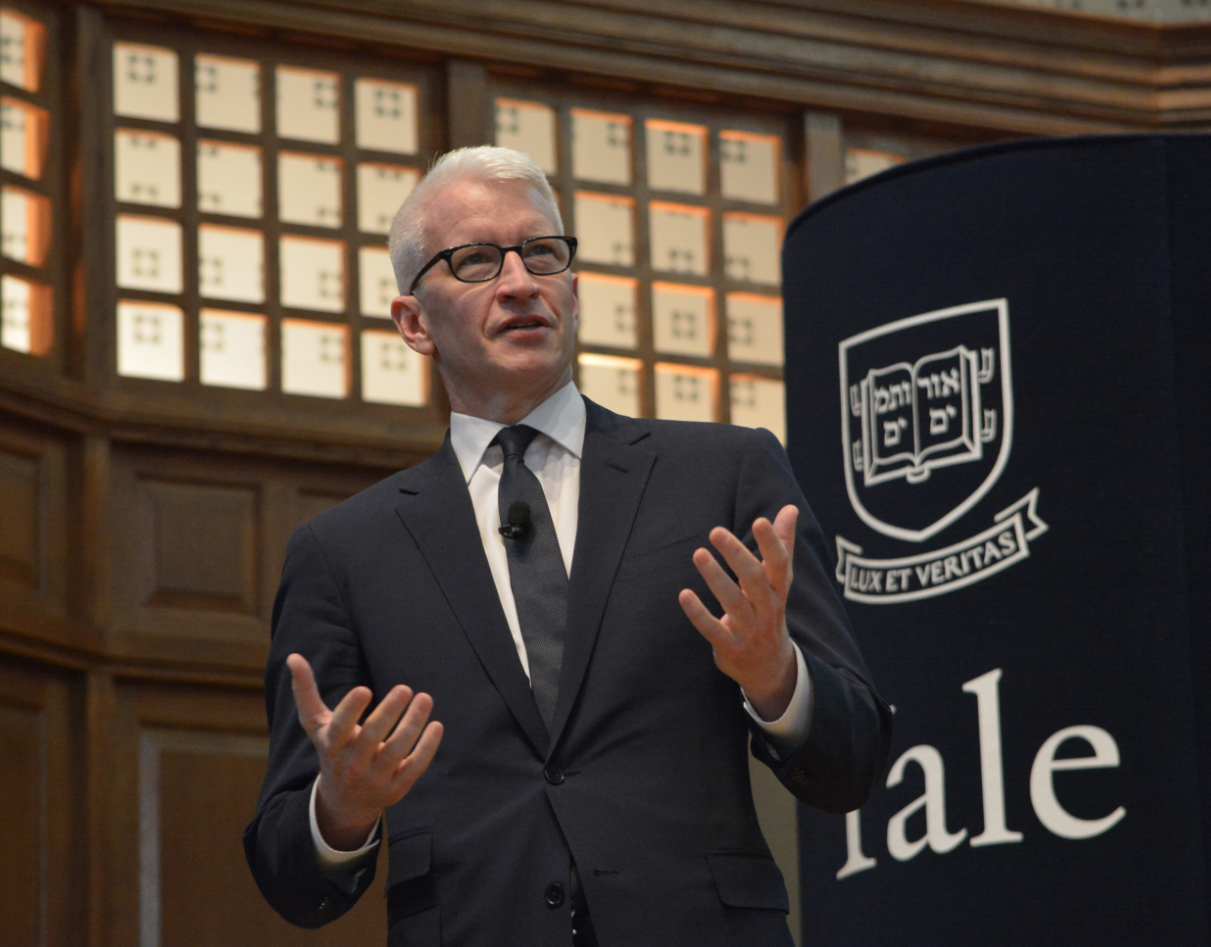
Schirin Rangnick
Prominent anchor and journalist Anderson Cooper ’89 visited Battell Chapel on Friday to accept the 2016 Yale Undergraduates’ Lifetime Achievement Award.
The award, which was created in 2014 by the Yale College Council in partnership with the University President’s Office and the Association of Yale Alumni, is the only award in Ivy League history that is completely elected and administered by students. Cooper was selected as this year’s recipient by student body-wide vote, according to the YCC announcement, in recognition of his “unparalleled” career in journalism and his accomplishments while an undergraduate at Yale.
At the event, Cooper discussed his experiences in and immediately following college. He said that when he was deciding on careers, he knew he did not want to look back on his life from a desk in a cubicle. Once he started reporting, he added, he could not imagine doing anything else, and he will continue working in journalism for as long as he is passionate about it.
“I consider it a great privilege of my life that I’m able to still go to places and tell people’s stories … and to bear witness to the struggle of people who are trying to live good and decent lives in the midst of chaos and war and disaster,” Cooper said. “For me, it’s one of the most rewarding things about what I do.”
According to YCC President Joe English ’17, who led the conversation with Cooper, the award’s purpose is twofold: first, to honor and thank alumni who have done outstanding work in a specific field, and second, to cultivate a richer dialogue between current students and these alumni.
The fact that the award is administered entirely by students, English said, lends it extra significance.
“Anderson Cooper is essentially being given this award by students who are sitting in the seats he occupied 25 years ago,” English told the News.
The YCC emailed a link to free tickets for the event — which drew over 1,000 students alongside a waitlist of nearly 200 — at 5 a.m. the morning of April 18. Spots ran out within hours, English said.
Students had the opportunity to submit questions for Cooper online. English said the YCC received between 40 and 50 submissions, from which he chose five. Students’ questions addressed Cooper’s time at Yale, emphasizing his role not only as a journalist but also as an alumnus.
Before answering questions, Cooper discussed his transition from college student to war correspondent. He said he initially did not know what he wanted to do but had “watched a lot of TV news growing up” and so decided to go into journalism. But after he was not hired for any of the entry-level jobs he applied to — Cooper punctuated this anecdote with a joke about the “value of a Yale education” — he eventually forged a fake press pass and snuck into Burma to report on his own. He has worked in the industry ever since.
Cooper emphasized that he did not initially visualize a concrete career path for himself. He said he was hesitant to offer any “blueprint” to students. He discussed riding a truck across sub-Saharan Africa during his senior year of high school, receiving his Yale acceptance letter at Mount Kilimanjaro’s base camp and traversing war zones.
“I’m a big believer in jumping headfirst into the things that scare you most,” Cooper said. “I don’t like the feeling of fear, which is a natural thing, but I don’t like that nervousness. I really set out, by the time I got to Yale, to systematically try to eliminate that as much as possible.”
He also discussed his fascination with “issues of survival,” explaining how his father’s early death and his brother’s suicide made him interested in telling the stories of people who had suffered losses. He said he sees his job as more of a duty than a career.
But Cooper noted that his relationship to journalism has changed over the years, saying he is now more attuned to the “business of news” and the danger of seeing oneself as a public figure. Cooper said celebrity can lead to a sense of entitlement, which is an issue for a reporter whose job is to focus on other people.
Attendees said they were drawn to the event by Cooper’s professionalism and passion for his work, as well as his status as a Yale alumnus. Manasi Patwa ’19 and Dasia Moore ’18 said they had grown up watching Cooper on television and were excited to hear him in person.
“As a Yale alum there’s obviously a sense of affinity there, but I like that as a person he’s been able to gain this position of fame and reputation within a pretty serious industry, but also be pretty funny and not take himself too seriously,” Aaron Berman ’16 said.
Deputy Secretary and Senior Director of Corporation Affairs Martha Schall said it was great that Cooper was able to take time out of his busy schedule to make an appearance, especially in an election season. While the 2016 presidential election was not explicitly discussed, Cooper did make reference to the debates and candidates, whom he has interviewed at various televised town halls.
“I love that he’s coming back as an alum,” Vashaana Sahadeo ’19 said. “It shows that people can go from Yale and accomplish so many great things, and then to be able to come back and share that is amazing. For him to get recognition from where he started is so cool.”
Cooper delivered Yale’s Class Day address in 2006.







